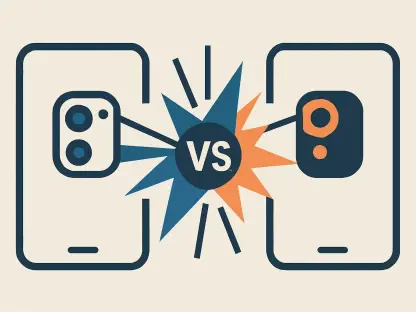As cyber threats increase in sophistication and frequency, implementing a proactive approach to network security has become imperative for businesses and individuals alike. The current digital landscape presents a myriad of challenges, making robust protective measures more critical than ever. With cybercrime costs projected to soar in the coming years, the significance of effective network security solutions is unmistakable.
The Rising Cost of Cybercrime
The relentless rise in cyber threats compels organizations to reinforce their defensive tactics. Cybercrime costs are expected to reach a staggering $10.5 trillion annually by this year, signifying profound financial consequences for entities lacking adequate security infrastructure. This projected figure underscores the sheer scale of the challenge faced by businesses today. Diverse attack types continue to plague enterprises, from simple phishing scams to more sophisticated Distributed Denial of Service (DDoS) campaigns.
Businesses of all sizes are targeted by these digital threats, emphasizing that no entity is immune. It is not merely a question of whether an organization will face an attack but when. The response cannot simply be reactive; organizations must adopt a multi-faceted approach to mitigate risks preemptively. This involves leveraging advanced security technologies and continuously updating protocols to stay ahead of emerging threats and evolving network infrastructures.
Impact of Emerging Technologies
The Internet of Things (IoT) has significantly expanded the potential attack surface, adding myriad new vulnerabilities. Each connected device represents a possible entry point for malicious actors. Consequently, safeguarding an increasingly interconnected environment has become crucial. As businesses integrate IoT into operations, they must adopt comprehensive security strategies to defend against the amplified risks.
Artificial intelligence (AI) and machine learning (ML) technologies have become pivotal in enhancing network security. These advanced systems can detect and respond to anomalies in real-time, often outpacing traditional methods. By analyzing vast amounts of data instantaneously, AI-driven security solutions can identify subtle patterns indicative of potential threats, allowing for immediate intervention and mitigation. This represents a shift toward a more proactive security posture capable of addressing both current risks and forecasting future vulnerabilities.
Regulatory Compliance and Accountability
Stringent data protection regulations, such as the General Data Protection Regulation (GDPR) and the California Consumer Privacy Act (CCPA), have made network security an even more pressing concern. Organizations are legally obligated to protect personal and sensitive data or face substantial consequences. Failure to comply with these regulations can result in significant fines, legal ramifications, and heightened scrutiny from regulatory bodies.
Penalties for non-compliance can reach millions of dollars, depending on the severity of the violation. Furthermore, beyond financial penalties, companies risk enduring damage to their reputations. Rebuilding consumer trust after a high-profile breach is a formidable challenge, leading to potential loss of customers and diminished future business opportunities. Therefore, investing in robust network security is not just about avoiding fines but maintaining the integrity and trust essential for successful operations.
Adapting to Remote Work
The transformation of work patterns precipitated by the Covid-19 pandemic has dramatically impacted network security protocols. As remote work becomes the norm, employees accessing corporate networks from varied and often less secure locations present new vulnerabilities. This shift necessitates stringent security measures to protect sensitive data accessed outside traditional corporate environments.
Employers must prioritize the protection of remote connections by implementing solutions such as multi-factor authentication, secure access gateways, and continuously adaptive security policies. These measures ensure that cybercriminals cannot exploit the weaknesses inherent in remote work setups. It is also essential to educate employees about best practices for remote work security, as individual actions can significantly affect the overall security posture of the organization.
Financial Ramifications of Data Breaches
Data breaches undeniably result in substantial financial repercussions for organizations. For instance, the Ponemon Institute placed the average cost of a data breach at $4.24 million in 2021, with these figures steadily rising. These costs encapsulate immediate remediation expenses, the long-term erosion of customer trust, and the potential regulatory fines and litigation costs. Data breaches can be catastrophic, underlining the necessity for robust, proactive security measures.
Investing in comprehensive network security is a cost-effective strategy compared to the financial fallout of a data breach. Preventative security measures, including intrusion detection systems, encryption protocols, and regular security audits, can significantly mitigate risks, protect critical data, and ensure stakeholder confidence. By prioritizing network security investments, organizations can effectively manage their risk exposure, thereby safeguarding their financial stability and reputation.
Cultivating a Security-Conscious Culture
A security-aware organizational culture is fundamental in combating cyber threats effectively. Employees often represent the first line of defense against cyber attacks. Thus, regular training and raising awareness about potential threats, such as phishing attempts and malware installation, are essential.
Encouraging a culture of security goes beyond training sessions. It involves integrating security protocols into daily operations, making security a part of the organizational fabric. Clear incident reporting guidelines enable swift responses to potential threats, reducing damage. Open communication about security matters ensures that employees feel responsible and empowered to contribute to the overall security posture of the organization.
Ensuring Sustained Success Through Proactive Measures
As cyber threats become increasingly sophisticated and frequent, it’s essential for both businesses and individuals to adopt a proactive approach to network security. We’re navigating an environment where digital challenges are myriad, highlighting the urgent need for robust protective measures more than ever before. The landscape of cyber risk is not static but grows in danger and complexity, making advanced network security solutions crucial.
Data breaches, ransomware attacks, and other malicious activities cause significant financial and reputational damage. Proactive network security helps prevent unauthorized access, detect potential threats, and respond effectively to incidents. By investing in advanced security solutions, organizations can safeguard their assets, protect sensitive information, and ensure business continuity.
In this era where cybercrime costs are projected to escalate, implementing efficient and innovative security strategies can’t be overstated. The stakes are high, and the significance of employing effective network security solutions is undeniable for both immediate protection and long-term resilience.









